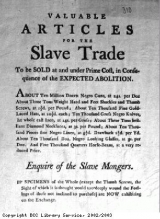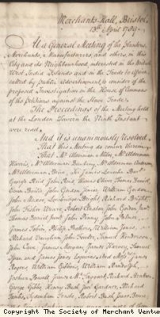Evan Baille
Evan Baillie was a slave trader, a merchant who traded with the Caribbean and a Member of Parliament for Bristol. As a plantation owner with some 2,000 slaves on his Caribbean lands, he was opposed to the Abolition movement to end the slave trade. He was concerned that ending the slave trade would lead to a demand for freedom for slaves on the plantations. Pictured here is a spoof advertisement for a clearance sale of goods which would have been used to trade for slaves. This spoof sale was advertised to be at the Exchange in Bristol. The threat of the end of the slave trade hung over the merchants involved in it for many years.
Like his fellow merchant John Pinney, the sugar trader, the prospect of the abolition of the slave trade made Evan Baillie think of selling most of his Caribbean interests. Instead of which, several merchants and plantation owners increased their holdings by buying up the estates of land owners who did sell up. When Emancipation did finally come and the slaves were legally freed in 1834, the Baillie family claimed £91,632 (£4,500,000 at today’s values) from the British government in compensation for the 3,100 slaves they ‘lost’. The following is part of a letter he wrote to his son Peter in Bristol in 1804, when Abolition was being debated in the Houses of Parliament:
“You will see how very feeble our efforts have been to oppose the Abolition of the Slave Trade. The Phrensy that has seized all parties on this subject is most unaccountable, I confess it allarms me most seriously, and it will induce me to think of abridging my West India business within very limitted bounds. At all events whatever the measure of abolition must prove a most fatal stab to West India credit as it renders all security on Estates highly precarious, having no promise or engagement to prevent any fanatical Minister from sanctioning even a measure of emancipation.”
Shown here are the minutes taken of a meeting in 1789 of the ‘Planters, Merchants and Manufacturers of Bristol’ who were opposed to the abolition of the slave trade. The gathering took place to discuss the effects on their businesses should the slave trade be brought to an end by the government. Evan Baillie’s name appears on the list of those attending the meeting.




